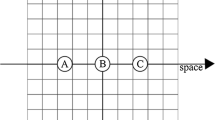Abstract
As I have repeatedly pointed out, symmetrical ageing in this problem is an inevitable requirement of the postulate of relativity. I have given tne argument in the simplest possible form1 in order to facilitate refutation if it is indeed wrong. I therefore find it inexplicable that Sir Charles Darwin2, while completely ignoring this argument (in which he is at one with all other critics), can write that “the accepted theory of relativity ċ quite definitely implies that a space-traveller will return from his journey younger than his stay-at-home twin brother”. His reason for this assertion appears to be identical with that of Dr. J. H. Fremlin, on which I have already commented3. Since that comment appears to have been inadequate, I will consider the problem posed in more detail, in order to bring out what I believe to be the misconception underlying such arguments as that of Sir Charles Darwin.
Similar content being viewed by others
References
Nature, 179, 1242 (1957).
Nature, 180, 976 (1957).
Nature, 180, 499 (1957).
Author information
Authors and Affiliations
Rights and permissions
About this article
Cite this article
DINGLE, H. The Clock Paradox in Relativity. Nature 180, 1275–1276 (1957). https://doi.org/10.1038/1801275b0
Issue Date:
DOI: https://doi.org/10.1038/1801275b0
- Springer Nature Limited





